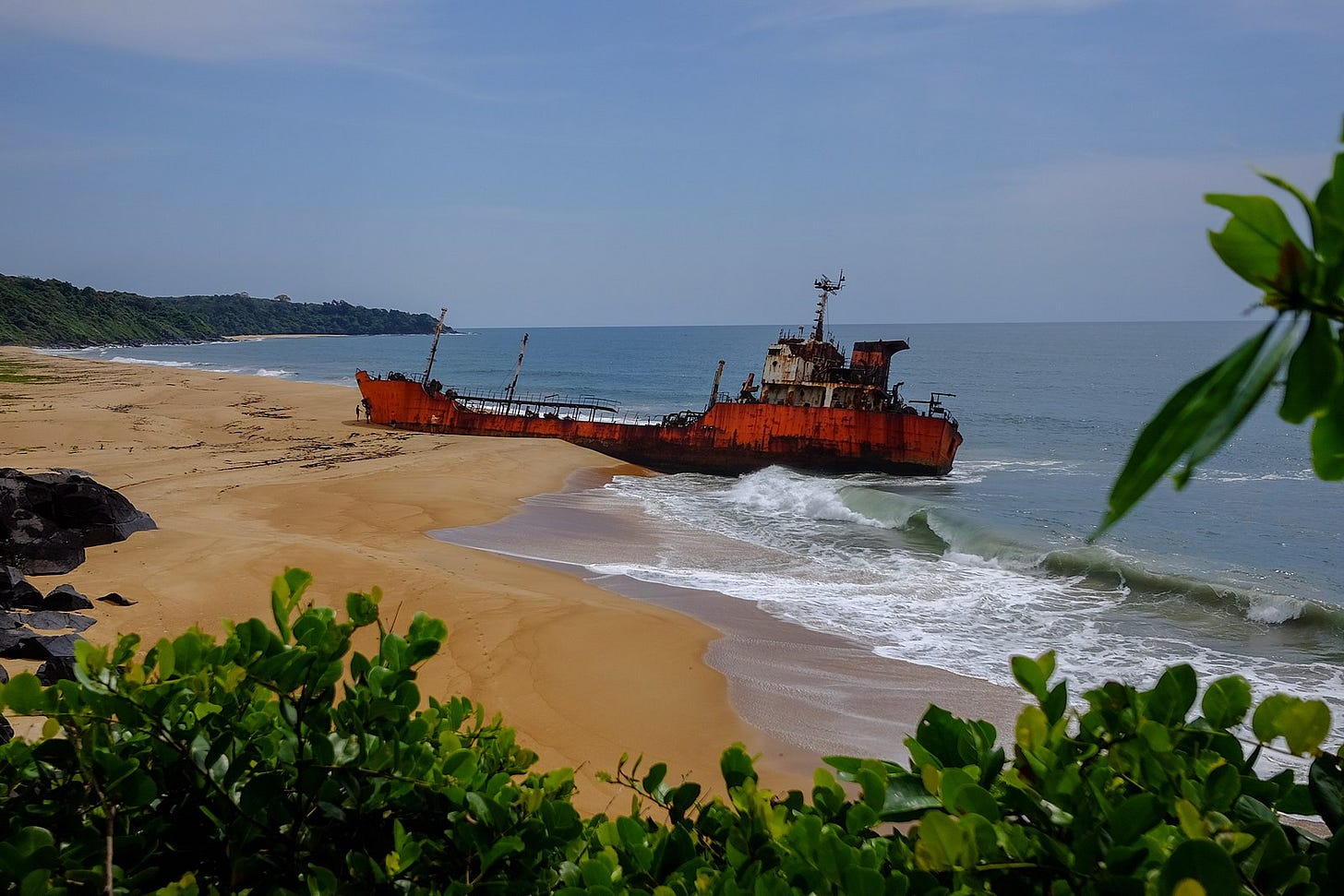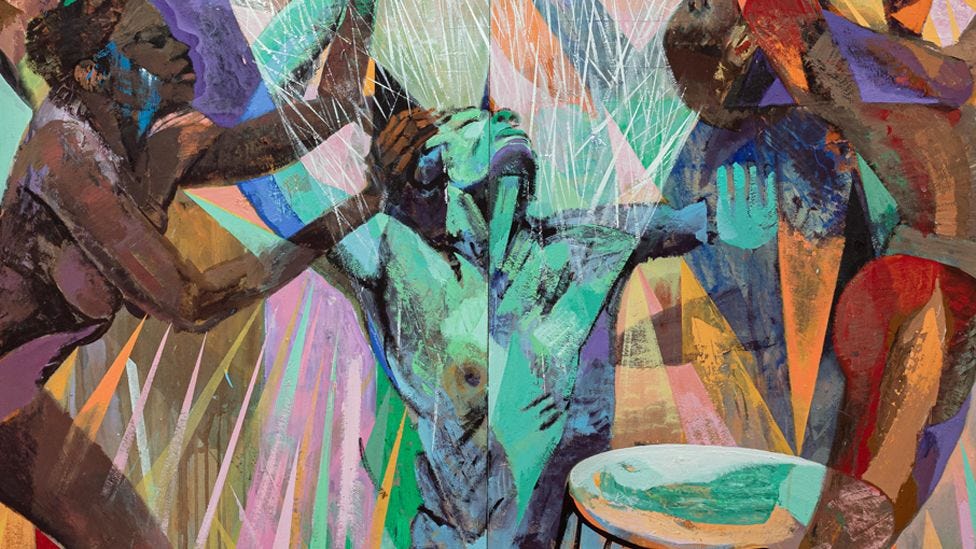🔅 UN Assembly: What You Need to Know & Honoring an African Abolitionist
Plus, Will Namibia Become the Next Petrostate? & What Is Nigeria's Okrika?
Photo of the day
A shipwreck near Robertsport, Liberia.
Markets:
🔴 Nigerian SE: 68,335.72 (-0.03%)
🟢 Johannesburg SE: 73,806.42 (+1.15%)
🟢 Ghana SE: 3,165.00 (+0.10%)
🟢 Nairobi SE: 97.17 (+1.03%)
🟢 US S&P 500: 4,455.06 (+0.25%)
🔴 Shanghai Composite: 3,108.57 (-0.52%)
Nigeria's Oil Output Goal: 300,000 Barrels or Bust | Nigeria, the big dog of African oil production, is looking to boost its output by 300,000 barrels a day if it wants to hit its goal of 6% economic growth next year. It’s a lofty target, but the country has done it before, in 2014. Nigeria produced 1.18 million barrels a day last month.
*Data accurate as of the close of markets across the continent
Brief & Bright: Africa's Top Five
The UN General Assembly Is Currently Under Way: What Does It Mean For Africa?

The UN General Assembly is like a high school class president—everyone has a seat, but not much power. It was created in 1945 as the main decision-making body of the UN, but its influence has waned over the years. At their annual meeting in New York, representatives from all 193 member states discuss global issues and vote on resolutions. But unlike the Security Council, the General Assembly can't impose sanctions or authorize the use of force. Its power lies in its ability to address international matters and make recommendations. Plus, leaders get a global platform to speak their minds. This year's theme is particularly relevant to Africans: "Rebuilding trust and reigniting global solidarity: accelerating action on the 2030 agenda and its Sustainable Development Goals toward peace, prosperity, progress and sustainability for all." Basically, in 2015, the UN set 17 goals it wanted to achieve by 2030, including some pretty big ones like "no poverty" and "zero hunger." But so far, only 15% of these goals have been met, and some are way off track. The Secretary-General earlier this week issued a "wake-up call" to get back on track by 2024. Let's hope they don't hit the snooze button on this one.
How a Caribbean Artist is Honoring an African Abolitionist
Che Lovelace, a Trinidadian artist, was on his way to prepare for the country's carnival celebrations (itself deeply rooted in African culture), when he got a message from a church in the UK. They wanted him to create an artwork to commemorate the life of an African man he had never heard of: Quobna Ottobah Cugoano. Turns out, Cugoano was an abolitionist in 18th-century Britain. He was captured in the Gold Coast, today's Ghana, at 13 and forced into slavery on a sugar plantation across the Atlantic in Grenada, but managed to gain his freedom in the UK and became a prominent figure in the Sons of Africa, a group of black Britons who campaigned against the slave trade. Lovelace's artwork, called "River, Passage, Spirit, and Vision of the Birds," is a series of 4 paintings that will be installed in the church that baptised Cugoano 250 years ago. Who knows, maybe this will inspire more stories of hidden figures to come to light.
EU Suspends Aid to Somalia
The European Union has hit pause on its humanitarian aid to Somalia after a UN investigation found that a whole lot of the funds were going missing. We're not talking about a few misplaced dollars here and there—landowners, local authorities, security forces and even humanitarian workers were all getting their hands on the aid meant for vulnerable people. Donors had increased funding to Somalia last year to help with a drought that has killed as many as 43,000 people in the region, but it looks like others saw it as a chance to line their pockets. The UN's budget for Somalia was supposed to be 72 million euros, with 10 million earmarked for the World Food Programme.
Nigeria's Proposed Okrika Ban: What is Okrika?
Okrika—Nigeria’s beloved thrift clothing—is under threat of a ban, but before we all start protesting, let’s take a look at what Okrika is and why it’s so important to Nigerians. Okrika has been around since the 15th century, when African societies made their first encounters with Europeans. It grew in popularity in the late 19th century as a way to show modernity and sophistication, and also as a way to convert to Christianity and assimilate into European ways of life. Missionaries and media channels, including newspapers and magazines, helped spread the word about Okrika. The term ‘Okrika’ is believed to have originated from Okrika, a town in Rivers State known for its strategic geographical location—a prime spot for goods shipped from Europe. Today, Okrika is not just about affordability—it’s about the thrill of the hunt and the spirit of resourcefulness. It’s a symbol of sustainability, community, and the timeless beauty of second-hand fashion. The Republic has an interesting write-up on it that you can read here.
Will Namibia Become the Next Petrostate?
Could Namibia be the next petrostate? Europe’s two biggest energy companies, Shell and TotalEnergies, are taking a gamble that the answer is yes. So much so that they’ve invested hundreds of millions of dollars in oil exploration off the coast of Namibia, and if they succeed, the small African nation could become one of the world’s newest petrostates. It’s a risky move for the companies, since global oil demand is declining due to the transition to cleaner sources of energy. But they argue that the world will still need oil until 2050, so they’re betting on Namibia to fill the gap. So far, they’ve had some success—Total announced the discovery of “significant light oil and associated gas” at the Venus site in February 2022. If this field is as big as some estimates suggest, it could hold more than 3bn barrels of oil—the eighth biggest oil discovery in the world since 2000. But getting there won't be easy: the most promising areas are located between 200km and 300km from the coast and in water depths of more than 2,000 metres. If the yields are fruitful, Namibia, with a population of 2.5 million and one of the world’s most unequal societies, could be transformed almost overnight.
Food for Thought
“The worlds of the elders do not lock all the doors; they leave the right door open.”
— Zambian Proverb.
Are we hitting the mark?
Enjoying Baobab's updates? Spread the joy and share us with friends and colleagues — we'd be thrilled to have them join!
Feedback or thoughts? Just hit reply. We're all ears!







